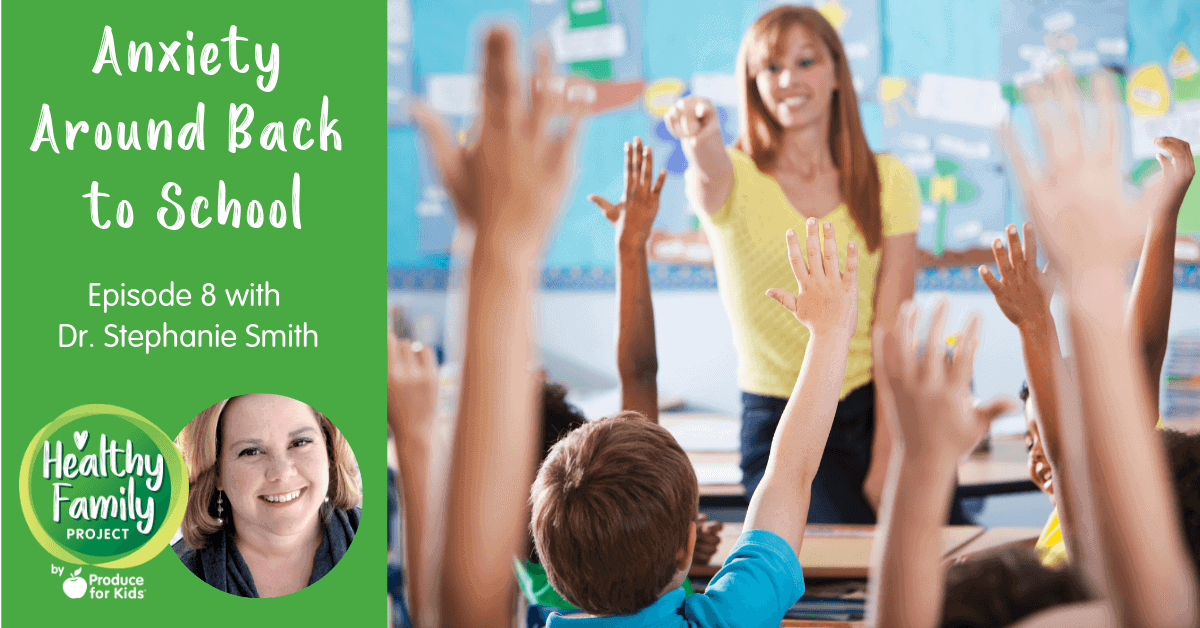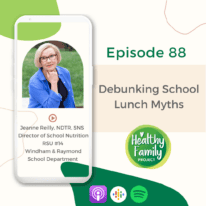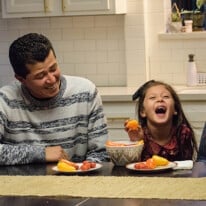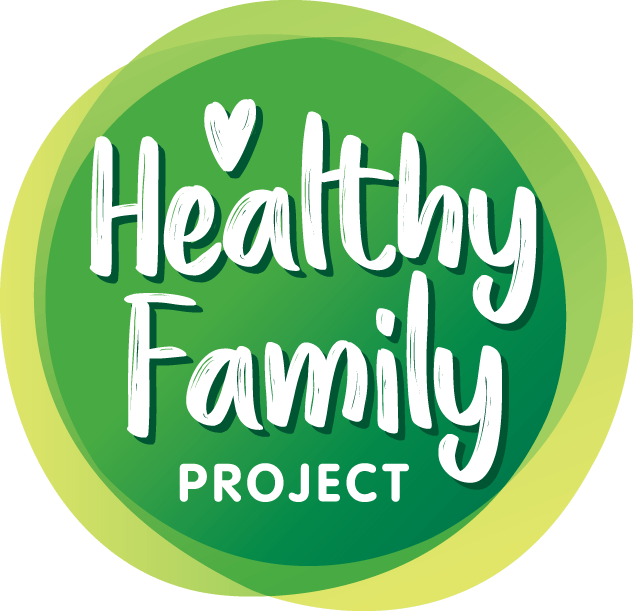Episode 8: Anxiety Around Back to School

We’re so excited to have Dr. Stephanie Smith back on the Healthy Family Project podcast! With back to school season in full swing, it’s normal for little ones to be anxious or have trouble adjusting to changes.
Dr. Stephanie shares ways to ease the transition from summer break to the new school year and how to manage stress and adjust to a new teacher.
Dr. Stephanie Smith is a mother, clinical psychologist, author of Dr. Stephanie, living in a suburb of Denver, Colorado. In her practice, she works with moms, dads, teens and tweens.
Dr. Smith uses humor, compassion and common sense to help people make positive changes in their lives. She especially enjoys working with parents to assist them in strengthening their families from the inside out.
Dr. Smith is the author of Dr. Stephanie, a blog where she writes about technology, parenting, friendship, and pop culture – all with a mental health twist. In addition, Dr. Smith is an official blogger for the American Psychological Association’s blog, Your Mind, Your Body.
Listener Survey!
Thank you so much for supporting the Healthy Family Project Podcast! We’d love it if you could take 5 minutes to let us know how we can bring you the best possible content for future episodes. Take the survey here.
Healthy Recipes & Tips in Your Inbox
Sign up for the Healthy Family Project e-newsletter to receive healthy recipe inspiration, our latest blog posts and more directly to your inbox each week.
Healthy Family Project Facebook Group
Join our Healthy Family Project Facebook group! This group will serve as a safe space for parents and caregivers to talk all about raising a healthy family – from dealing with a picky eater and tips to get more fruits and veggies onto plates to exercising as a family and mental health. We welcome all of you to join in!
Want to skip straight to a hot topic? See time stamps below. But of course, we recommend listening all the way through!
- 0:37 – Power Your Lunchbox
- 6:40 – How to transition from summer break to the new school year
- 11:22 – How students can adjust to new teachers and teaching styles
- 17:55 – How to identify things kids can control to reduce anxiety
- 26:28 – Dealing with anxiety in the lunch room
Relevant Links:
Healthy Family Project Podcast
Conversations covering hot topics in the world of health, food and family with a dose of fun. Helping families ease their way into a new fresh and healthy world.
Be on the lookout for new bi-weekly episodes and don’t forget to subscribe on Apple Podcasts, Google Podcasts, Spotify or your favorite podcasting site. If you like an episode, make sure to leave a rating and comment.
If you are interested in being a guest on the Healthy Family Project podcast, contact amanda@healthyfamilyproject.com with your topic idea for consideration.
Transcript for Episode 8
This transcript was produced by Otter.Ai. Please forgive any misspellings and grammatical errors.
00:13
Welcome to the healthy family project by produce for kids, covering the hot topics in the world of health,
food and family with a dose of fun. Hi everybody, we are in full back to school mode here at produce for
kids. But listening to this episode about helping your kids deal with anxiety around school in general is
truly relevant anytime of the year. So if you’re listening in and it’s before September 22, that is awesome.
Because the power your lunchbox promises still open. So you need to head to power your lunchbox.com
make the promise to eat healthier this school year, and snag more than 70 Registered Dietitian approved
lunchbox ideas, coupons, tips and recipes to solve all of those breakfast snack and dinner dilemmas that
are that are sure to to come up here in the next couple of weeks. So and also for every promise made,
our wonderful partners will collect collectively Give $1 back to Feeding America programs that benefit
families and children. So it’s a win win, you eat healthy families in need receive much needed nutritious
meals. I do have to apologize. On the audio on this upcoming episode. It is we had a little bit of technical
difficulties. So bear with us. I promise we’ll work through it for next time. I did think about nixing the
episode and then realize that this topic is so important. And it would be a huge injustice to all of our
listeners, if we did not share this episode with you guys. So I promise I’m working through it. It shouldn’t
be too bad. But there’s a little bit of an echo, so bear with us. So we all know mental health is important.
And it’s important we are tuned in to our children’s mental health as they navigate through those tough
situations that pop up through the school years. You know, there’s there’s something at every at every
stage that we need to tap into. So today we’ll be talking to Dr. Stephanie Smith, mom of three
psychologist and founder of Dr. Stephanie smith.com. So we’re gonna chat with her about dealing with
back to school anxiety, managing feelings about new teachers, and change of teachers and squashing
negative energy around a problem subject like math or science or PE, whatever it might be. And then
also dealing with lunchroom stress successfully, because that seems to be a place in our kids day where
the that anxiety and stress stress pops up. So and also really for us parents, I mean, we’re not exempt
from the back to school stress and anxiety, so taking care of our own selves. So let’s jump in with Dr.
Stephanie, and lots of hot topics to cover. And I think you’ll be really, really excited about what she has to
say today. Welcome back, Dr. Stephanie. We’re excited to have you back on the healthy family projects.
03:18
Thank you. I appreciate being here.
03:21
Wonderful. So we have the opportunity to talk to you in episode three about managing screentime
effectively in this digitally immersed world. And we are very excited to have you back to chat about
anxiety around back to school. We all have it. I know I do. The kids have it the tweens the teens, I don’t
think anybody is exempt from that that feeling that we have this time of year. So before we jump into our
topic for today, for those of our listeners who might have not have had a chance to listen to episode
three, which you definitely should managing screentime very important. Can you tell us a little bit about
you and your website and a little bit about the inspiration behind your career path and your website.
04:09
So I am a psychologist in Colorado, and I work with all kinds of different folks for all kinds of different
issues. So I work with families and adults and tweens and teens and I started my website, Dr. Stephanie
smith.com Quite a few years ago now just as a way to help educate folks about the importance of good
mental health and psychology. And I really tried to make it down to earth and accessible and easy to
read. And so that’s really what I’ve tried to focus on these last Gosh, I don’t know 10 years or so. So
that’s a little bit about me, but I’m also dealing with that fiscal stress with my family. So I’m hoping I
learned some things today to
05:06
wonderful. Yes, definitely. I think we, we as parents can all learn from one another tactics and things to
do during this time and things that work and things that don’t work. We all know that we have some of
those too. So, we are absolutely so lucky to have you as our sounding board, at produce for kids on our
produce for kids blog as a regular contributor, especially the Ask the psychologist series that we’ve been
working on where you’ve been so wonderful in answering some questions from our listeners and our
produce for kids audience. So we thank you for that. Okay, so let’s let’s go then question one, give us
some tactics we can use leading up to the first day of school the kids are nervous to start a new school
year new routine. And quite frankly, as much as we would like to say we aren’t parents are as well. those
lazy days of summer are gone. There’s, there’s, you know, where there’s no homework and after school
activities are, you know, have kind of ceased to exist. And I remember being a kid and not even being
able to sleep the night before the date first day of school. More more. So as I got older, and then going to
junior high and high school just brought on so much anxiety, I was just a kind of a mess during that time
on those first days. So what can we do? Do you have any tips or tricks to help alleviate this madness for
families?
06:34
Yeah, so I think one of the things that I have been trying to implement the last couple years is just some
sense of balance between being prepared and organized for the first day of school, but also kind of
letting things ride a little bit. Because we just never know what changes are going to happen or how
things are actually going to pan out. So some examples, I think, you know, with, for my kids, it’s
important, they like to make sure they have all their school supplies, they like to know what they’re going
to wear, especially my girls, you know, that’s important to them, they like to have some sense of their
schedules in their teacher. So I think all that’s important to know, but I think it can be really easy to go
overboard and start almost, you know, creating more anxiety by talking about it over and over and over
and trying to figure out every detail and every minutiae of what the first days and weeks are going to look
like. So just another quick example of how it can go overboard the other way. A couple of years ago, my
husband and I were both feeling really overwhelmed about how we were going to get our three kids to
school, all their various practices and lessons and classes. And we’ve spent hours coming up with a
schedule of who’s driving where and when we need to carpool and long story short, for the entire fall
semester, no week ever went like we had planned. So that was your feel less than to me to like, be
prepared, have some sense, but also leave plenty of room for like, you know what things are gonna
happen. And people are gonna get sick, or it’s gonna snow in September, or it just weird things. So we,
it’s not necessarily useful to over prepare. So that’s my, that’s one thing I’ve been trying to do, like I said,
the last couple years is have a balance between being organized and prepared, but also leaving plenty
of room for the unexpected.
08:57
That’s a good, that’s a good strategy. I know. You know, we get that supply lists here in in Florida every
year and it’s just, you know, this whole list and Everybody’s rushing out and they’re filling up their bags
and and you know, the clothes and back to school shopping. It’s it’s such a buzzy you know that time and
so I’ve like you said I try to tune in to the girls and see like, what it is like Is it their first day outfit that’s
going to make them feel you know better about going into this next year? And this next chapter? Or is it
that they have their sharpened pencils, like my seven year old who has everything completely in order,
you know, does she have her eight sharpened pencils is that what’s what’s gonna make her feel? You
know, and then I guess even for ourselves looking at what will help us to you know, kind of feel
comfortable back moving back into that scheduled routine and I know that feeling of getting all those
activities scheduled because as our seven year old moves into that, you know, has moved into it and is
in that realm just adding, when we had our older daughter doing things, it was like, wow, we’re running a
lot. And then the second one moved into the mix of afterschool activities. And it’s like, how do I clothe
myself?
10:16
It’s a puzzle for her.
10:18
Oh my gosh. So, okay, so awesome. So we’re prepared, we’ve managed day one. I know a lot of schools
are either starting back this week, I know, some in the northeast, don’t go back till after Labor Day we
started last week. But alright, so we’ve we’ve prepared, we’ve managed day one, we’re getting into the
mix. And, you know, teachers change year over year, and we’ve heard this a lot of producer kids about,
you know, my kids just not adjusting to a new teacher, they don’t like their teacher, you know, maybe their
teacher last year was a little more fun and games. And this one’s a little more strict. So do you have any
thoughts on helping students kind of like, adjust to these different personalities and teaching styles and,
you know, just helping helping these kids adjust year over year, because, you know, it starts in
elementary, and it’s going to be a long time, that they’re different teachers to adjust
11:14
to. Absolutely. And I think that’s such an important life skill to be able to be flexible, and adaptable. So
this is I think, one of the most important things we can help walk our kids through as they’re younger.
And, and you know, that we know for sure, there’s going to be years where they click with their teacher,
and there’s going to be years, when they don’t, there’s going to be years, they love their baseball coach,
there’s going to be years that it’s more of a struggle. And so I think the most important thing that we can
do, is to manage those feelings ourselves in kind of a healthy and calm way. So what’s not so useful is to
help is to kind of complain to them, like, Oh, you’re right, she is a jerk, or she doesn’t know what she’s
doing. She’s so young, she can’t, you know, kind of see that. Right, that difficulty? I think things we can
say is like cash, I hear, I hear that it’s been a little bit harder this year for you to get into the groove of
fourth grade. You know, are there are there things you could talk with your teacher about, you know, that
that you’re struggling with? Or are there strategies we can come up with at home to help you ease into
the school year better, you know, some kind of concrete conversations I think can be useful, but really
trying to avoid feeding into that, yes, she sucks, or he sucks break wood, it can be easy to do as a
parent. I mean, we all know on the surface not to do that. But yelling are stressed ourselves or frustrated
ourselves. It can be really easy. But I don’t think it does our children any great service to just add fuel to
the fire. And I think, you know, another thing that can be useful is to reflect back on other times they’ve
been in these situations, and they’ve made it through. So for example, one of my kids had a pretty
challenging soccer season in the spring. And it was just tough all the way around for all kinds of reasons.
But you know what she made it, she made it through, she’s still playing. And now she’s got a great
situation. And so that’s going to be something that I’ll be able to help her remember, next time. She has a
tough teacher, tough coach, or tough neighbor or whatever. Like remember that time in soccer. And it felt
so hard and so awful, but you made it, you got through it, and now you’re in a much better situation. So
helping them know that they they have the resilience to make it through and chances are it’s going to be
much better on the other side.
14:20
Yeah, that makes a lot of sense. I know. My older daughter she is is we’ve had this conversation several
times and I feel like it’s it’s sometimes I see these changes and it’s good year over year, especially back
in elementary, you know, one teacher was just rainbows and butterflies and everything was you know,
Shin mio had a really close bond with this teacher and they were just, you know, and I had kept thinking
this is gonna be hard next year. It was but at the same time, I thought but she has to know it’s not always
that way. You know you have people In life, you know, and I’ve learned over the years, from teachers, to
professors, to bosses and supervisors, you know, it’s all about, you really have to think how can I work
with this person instead of against them? Yeah, I think once you find those tactics like, you know, and not
that, and I tell them like not that you have to back down from who you are, completely change yourself in
life to be able to, you know, accommodate everyone else. But at the same time, it’s, it’s definitely an
important skill, to have to be able to adjust and to be able to kind of understand people and understand
what you need to do to have a successful relationship.
15:45
Right, right. And remembering to keep it in context, like, teachers are important, but, you know, there’s
probably all other kinds of wonderful influences on their lives, whether it’s friends or family members, or
the bus driver or whatever. So I think sometimes trying to focus on those positives can be useful to not
always dwelling on Mrs. So and so is such a pain.
16:17
Right, right. Well, and so, okay, so we had last year was first year of middle school, and there was a
class that was, was kind of, you know, even though like he said, There were their positives all day long,
we had one subject that was, you know, and this is with me, she’s a theatre girl, she’s the performer, the
musician. So, when it comes to math, we run into, we run into some roadblocks. So, you know, last year
it was, even though kids, so many positives going on, there was so much anxiety around math, even
before he, you know, they moved into a new subject or a new topic, or, you know, she was already
feeling that negativity, doubting herself. And you know how this is going to be so hard for her. And I’ve
just worked over the years to help her understand that, you know, doing her best and giving 100% That
success, but she just don’t want us to have the stomach ache around math. Even this year, it’s first
period, she doesn’t she didn’t even know who her teacher was. And she was already before we slipped
back into school. Oh, it just first periods going to be horrible. So oh,
17:30
oh, that’s so hard. And I and she certainly not alone. I mean, good grief, so many kids struggle in that
way. I think one real important thing to talk about with kiddos, especially once they have reached kind of
late elementary and certainly into middle middle school age and beyond. And certainly identify things that
they can control and they can do. So I think sometimes at school, it feels like, I’m just doing what they tell
me I have no control. I have no agency. But really they do. So if you talk to your daughter, or if I talk to
one of my kids about okay, struggling in this class, this topic is really hard. What are some things that we
could actually do that might change the situation. So for a middle schooler, or a high schooler that might
include making sure you’re going to the office hours or whatever they call them at your school, you know,
so like my kids school, they have a couple days a week after school where the kids can go in and meet
with their teachers, for one on one or small group help. So that is something they have control over. And
they can do, they don’t have to rely on parents or anything, they can just do that themselves. So that
might be important to write down. Okay, we can do that. What are some other things we can do? Well,
how about talking to the teacher specifically about the feelings that you’re having the fears and the worry
you’re having around math, and maybe they have some strategies that could help or at least be aware of
it in the class. So that could be another thing you could do. A third thing you could do is look at some
outside resources. So you know, middle schoolers might be past doing like flashcards, though, that could
still be helpful. But I know there’s quite a few and I can look this up to add to the show notes. I can’t think
of any on the fly here. But you know, free websites that help kids review math concepts, in maybe a
different way than their teacher presents it and I’ve known a number of children who’ve had a lot of
success with that. So that’s the third thing that you could do. that’s in your control. So those are just a few
examples. I think when we’re stressed and worried and overwhelmed, it’s really easy to feel like, Oh, this
is, um, this is a hopeless situation, there’s nothing I can do. But as parents, I think we can help our kids
see, okay, let’s break that down. Because you’re not helpless. But let’s, let’s outline some things that you
actually can do and have control over. And I think that can sometimes be really helpful, not only to
managing the anxiety, but also to help just with the skills that you’re struggling with, whether it’s math or
Spanish or whatever. Does that make sense?
20:43
Yes, that does make sense. It really does. I, it’s, you know, when she goes to that place, I always say
she, when she’s in that place, and her mind is in that place, I have to give her some time before I can
talk. Because she’s already dead set that, you know, this is not going to work and going into it negatively.
And, yeah, once I give her a little space, and she comes back around, and we’re able to talk it through
and, you know, kind of figure something out. And I always say even produce for kids, if there’s projects
that I’m working on. And I’m really stumped, and I’m starting to feel like anxious and this is too big, then I
do that that same thing, like you said, break it apart, I look at it and say, You know what, this may not be
something that I can just sit down and do. Like, let me look at it and break it out into four separate, you
know, quadrants or whatever and, and work on it that way. So then I’m not looking at it as this like
mountain that I have to climb. So I think that’s a really good advice.
21:43
Yeah, and I think your point is also a good one that, you know, when they’re crying and yelling, and all
that, probably not the time to bring this up. But maybe over the weekend, or a time when they’re when
you might actually have some free moments. And people are feeling pretty good. That can be a great
time to have this conversation. Or, you know, if your kiddos haven’t started school yet, and they don’t
starve for a couple weeks, now’s a great time to have those kinds of conversations. to kind of get one
step ahead of what you already know, might be a sore point.
22:24
Yeah, that’s, that’s good advice. For sure. And not to go off track. But I have you saying that about
whenever they’re in that mode, it made me think of our last podcast recording when you were talking
about the apps that help, you know, that will you can set time limits on iPads and things like that. We
started that a little bit over the summer. So thank you for those recommendations. And your point was,
well, when it’s eight o’clock or nine o’clock, whatever your time, set time might be, you don’t have to have
that interaction where it’s alright, this is gone, like I’m taking this or, you know, time to shut it down. Both
of my No, it shuts down, we we came up with a little family charging station, you know, the like a nice
little area where they know they can put their devices and they know they’ll have 100% charge in the
morning. And so. So thank you for that, because that has helped tremendously, because I feel like there
was a lot of stress that went around those moments where it was time to put your devices away.
23:30
Yeah, that’s so exciting. I’m glad that’s working.
23:33
Yes, for sure. And I’ll link Actually, I’ll link back up to that app that I’m talking about the one that hadn’t
and several of the others you recommended, because I did work through several of them this summer
just to see what via good fit for us. So I will link to those in the show notes. And if like I said in the
beginning if you are interested in learning more about managing screentime definitely go back and listen
to episode three. Okay, back on track. So this was a this is was an interesting Well, Part Part of this was
something I never had really thought about but came to light several years ago it produced for kids and
really surprised me and then my kids actually encountered it themselves. So anxiety around the cafeteria
or lunchroom, I feel like there’s a lot of different, you know, aspects that could cause anxiety from you
know, who you’re sitting with, or maybe you don’t know how to start a conversation with someone. And
then like my kids have been made fun of for certain things that they take in their lunch and, you know,
we’ve worked through some of that where someone has the Oreos are potato chips and and then they’re
sitting there with their homeless and cucumbers and their you know, veggie wrap or whatever and they
have had Those other kids really, you know, make fun of them, Oh, your lunch smells and what is that
kids don’t eat that kind of thing. And so, you know, we balanced it out, it’s not that I send them with a
garden hose in every day. But, you know, we, we recognize, and they recognize that there are certain
things that are going to fuel them throughout the day, and there are certain things that are not going to
fuel them. So we’ve encountered that. And then sorry, this is going to be like a whole, you know, a whole
big thing for you to talk about. But I know as a child, for me, I received reduced lunch. And I just can think
back and remember being so embarrassed, you know, the crowd, my crowd of friends, I would like wait
for everybody to go through the line, because I didn’t want them to see me using my card. And, and I feel
like that’s another stressful thing around lunch, that there’s so many families that, you know, are facing
hardships and weather, you know, you’re free or reduced lunch for a certain period of time or for your
entire all of your school years. It’s that can be something I know personally, that was like just so much
anxiety, I just didn’t even not even want to go to the lunchroom. So there’s a lot What do you
26:12
know, I, I? Yes, cafeteria and lunchtime is a huge topic of concern. I think for kids of all ages. You know,
even once they get into high school, you know, around here, they can leave campus. And then there’s
drama about who am I driving with and who’s doing what I mean, it’s just never ending. Um, so I think
one of the most important things that we can do, and that I recommend for the families that I work with all
the time, is to really understand the resources that are available at school. So for example, if your kiddo
is having trouble in the lunchroom, for whatever reasons, social, financial, dietary, whatever, I think it’s
important to talk to the school about it, not in a way that’s complaining, but sort of saying this is an issue.
What do you think, are some options, and I think most every school that I’ve worked with, and I hope
most every school around the country is really open about that. And there’s probably more going on at
lunchtime than you realize. So maybe the counselor offers, like a social skills group. Once a week, that
would be a good fit for your kid, maybe the principal offers, you know, a lunch with the principal period
once a week that your child would enjoy and could get a break from the lunchroom doing that maybe the
librarian could use help. shelving books during the lunch period. I knew a girl years ago who loved PE
but hated lunchtime. And she talked to the school and the PE teacher said well, why don’t you come be
my aide for the kindergarten class because their PE class is the same time as your lunch, which was an
awesome opportunity for her. So obviously, I can’t guarantee those things are gonna happen. But I think
a lot of times, we as parents try to figure these things out on our own. But there’s a lot of use in opening
up and reaching out to the folks at school, and seeing what kind of solutions they can come up with.
Because they just have a much better understanding of what’s available, what the dynamics are, than we
ever will. So I think that’s my, my biggest tip is to shoot an email to the principal or go in and meet with
the school counselor or the teacher or even the lunch lady and see what kind of options are available.
Because sometimes even just what you know, Wednesdays, I don’t have to deal with the lunchroom
because I’m going to go help with the kindergarteners like sometimes that’s enough of a break to make
the rest of the week. Not only just bearable but more pleasant to
29:27
you know that that makes sense there I feel like even last year starting at new school, I really didn’t
realize all the resources that were available, you know, to parents and going into it like you said not as
complaining like you need to fix this, you know, it’s it’s not a good approach. I think going into it like you
said like what is available? What options do we have? How can we make this work? Yeah, those are all
really good, really good tips. Yeah, cuz
29:57
that’s I say I think there’s a lot more going On in the schools, then most of us realize because we’re not
there day in and day out. But they’ve got a lot of neat stuff going on. Typically, they just don’t advertise it.
But if you ask, I am hopeful that they would be very happy to share.
30:19
For sure. Awesome. Well, we are so lucky to have you help us through this time. I know. We could talk
forever on on back to school. But I think that what you know, the top level things we talked about today
will be really helpful for our listeners. And I must say we still have power your lunchbox going on
speaking of cafeterias, so I know you are helping us out and working with us to get promises going. So
that is open till the end of September. But you can still year round access all of the lunch boxes and visit
Dr. Stephanie’s website as well. For information on power, your lunchbox, so thank you so much. We are
so appreciative to have you as the expert in this area, helping us out and as a parent as well going
through things and sharing what has worked for you. So we will have a blog post up on produce for
kids.com that outlines a lot of what we talked about today. And then I will include relevant links in our
show notes. And if you have any additional questions for Dr. Stephanie, you can drop those at the
bottom of her blog post on produce for kids.com or over on healthy family project. podcast.com. So thank
you so much for talking with us today. Dr. Stephanie.
31:42
Thanks for having me. This was really fun.
31:45
Thanks for listening in today. Well, sometimes mental health can be a tough subject to tackle. It’s
something we all need to keep on our radar not only for our kids, but for ourselves as well. I’m hoping
what we shared today will make a difference in your world. You can find Dr. Stephanie on her website,
Dr. Stephanie smith.com, where you can link out to all of her social media sites, and then you can also
find her on produce for kids calm in our Ask the psychologist series. Please be sure to go to power your
lunchbox.com to make the promise and check out everything we have going on over there for back to
school. If you know a special teacher send them over to make the promise for their classroom. We do
have fun prizes like a fish tank ecosystem, and a classroom mushroom growing kit as well as free
printables for their classrooms. Check out new content on our social media outlets Facebook, Twitter,
Pinterest and Instagram as well as YouTube. And a big thank you from the POTUS for kids family as we
celebrate our eighth episode. We are very grateful for all of you and grateful that we can have these
conversations, questions, comments and episode ideas can be posted on healthy family project
podcast.com Be sure to subscribe talk soon












